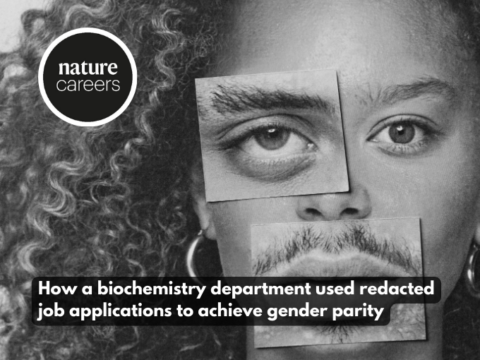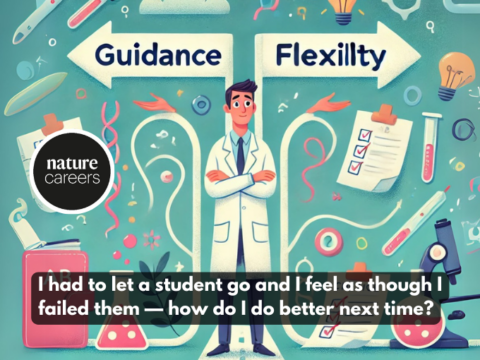
Three scientist mothers call for a change in how conference childcare costs are reimbursed, drawing on their personal experiences.
“How did you manage to get away from home for three days?” This was the first question we asked each other after meeting at a workshop hosted by our funding agency. Our answers were similar: careful planning, and negotiation with partners, institutions and, more often than we like, our own parents. We shared stories of presenting a poster with a young baby babbling away in a sling (L.J.P.), roaming the streets of Paris at 4 a.m. to get a baby to sleep ahead of a presentation later that morning (L.W.) and navigating international research visits with no financial support for family travel expenses (L.C.).
A common experience was that our colleagues thought that travelling for work with our children somehow meant trying to take our kids on holiday, when in fact we were desperately juggling childcare and our careers. Travel is crucial to career development in science: we need to participate in conferences, field trips, collaboration visits, workshops, meetings, interviews, PhD vivas and more. These forums help to communicate discoveries, form collaborations, make contacts with funding agencies and journal editors, and attract new members to our laboratories.
But for every trip, the additional workload for carers is high and extra childcare needs to be found. Although partners and family members can sometimes help, alternative childcare arrangements often need to be made. This frequently imposes a financial burden that is not covered by grants or research organizations. Ultimately, it means that as academics with caring responsibilities for young families, we face inequitable hurdles to fully attend and participate in activities that require us to spend time away from home.
We are all based in the United Kingdom, where many research funders (such as UK Research and Innovation and the Royal Society) have adapted policies to reimburse the costs of extra childcare, family travel or caring responsibilities (if the costs are incurred for working outside normal working patterns). These funders acknowledge that costs for dependants should not be parents’ financial liability. But in reality, we still rely on the employing research organization to dictate what exactly can be claimed as an expense. We don’t think these policies go far enough. Carers need organizations to update and align internal financial reimbursement policies — a step we think is overdue at many UK institutions.
We applaud the initiatives that some organizations have put in place to help parents, such as those of the British Society for Immunology (BSI), which in 2019 introduced a crèche at its congress, but more needs to be done. On the surface, an on-site crèche might seem like a great offering, but only an average of two carers accessed it each day, says a BSI spokesperson. For many people, placing young children into external childcare facilities with unknown carers isn’t going to work, so alternative means of support must be considered. In response to this low uptake, the BSI has since paved the way by offering flexible grants, specifically for carers, to help cover their costs. We encourage other research organizations, institutions and learned societies to follow suit. Furthermore, employers, funders and organizations need to consider how best to reduce the financial burden of bringing young children to conferences as well as how best to cater for carers’ participation in smaller events, such as workshops, research visits, invited seminars, interviews or PhD vivas.
Flexible and inclusive grants
In our experience, existing policies that aim to help with some of the logistics of childcare are not delivering the much-needed support they set out to achieve. And extra funding opportunities, to help solve the issue flexibly, are often restricted to permanent faculty members, are available only to members of some learned societies (which have membership fees) or are reliant on existing grant funding.
Another experience we all share is changing personal circumstances. One of us is still working with a grant that was written, costed and awarded before she had children, and so did not budget for the extra financial burden of travelling with dependants. As a result, expense claims are regularly much higher than initially anticipated, reducing funds available to cover, for example, staff development, research consumables and equipment. Given that many researchers have caring responsibilities and that this responsibility falls mainly to those at the early stages of their academic career, when the attrition rate is at its highest, the current ‘support’ system is not sustainable — nor is it effective.
Above all, those working in science policy must accelerate change to deliver initiatives that genuinely support those in need and that do not further burden an already overworked community. Opportunities need to be flexible, adaptable, comprehensive and transparent. Here are four steps that can be used to improve current policies:
• Flexible — family-conscious grants must allow for extra funding requests to cover the costs of having a dependant, including expenses for a registered childminder or, when necessary, travel costs for dependants or those who care for them. Researchers would need to justify their requests, but the application forms should reflect the fact that personal circumstances differ, and approval should not be dictated by what the funder or employing institution considers appropriate. Having more trust from funding providers will help to cut through red tape and protect researcher-parents’ time.
• Adaptable — funders should provide opportunities for grant holders to apply retrospectively for extra care for dependants and travel arrangements if their situation changes.
• Comprehensive — family-friendly funding policies should be available for all early-career scientists (such as postdoctoral research assistants, PhD students and junior lecturers) who do not have existing grant funding.
• Transparent — organizations should consistently implement funders’ policies that support childcare responsibilities to ensure equity for all scientists.
Whether travel is considered to be a positive aspect of science or not, it is an absolute necessity for many reasons. The issue of managing travel with parental responsibilities has been highlighted for years and, despite some progress, researchers still face many hurdles. We call on universities, funders and learned societies to invest appropriately in those with care responsibilities. Current frameworks are not flexible or equitable enough, and are ultimately failing those who are trying to maintain a sense of balance between caring and their careers.
This post is shared from the Nature Careers Website – for this and more great content visit: https://www.nature.com/articles/d41586-024-01571-x
Read more on challenge for Researcher Mothers in our blogs from Emily Spencer

 Print This Post
Print This Post





